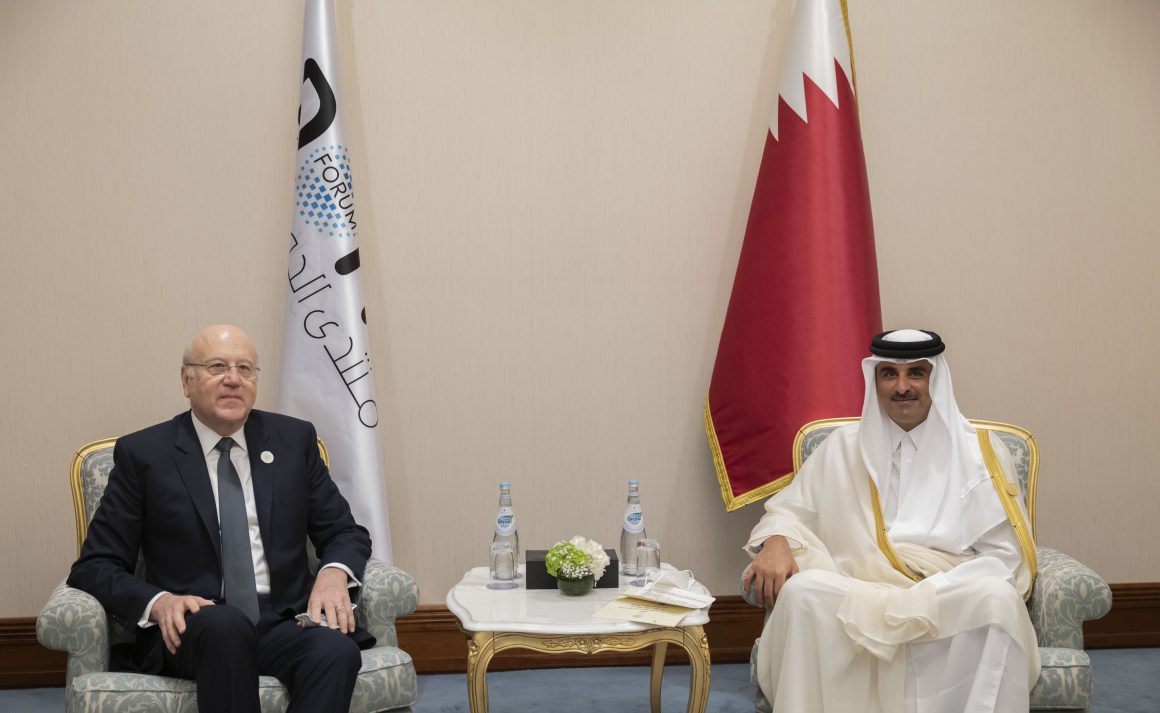Lebanon has been grappling with a worsening economic and humanitarian situation over the past three years.
Lebanese Prime Minister Najib Mikati said that GCC is resuming its normal ties with Lebanon on Saturday following a meeting with Qatar’s Amir Sheikh Tamim bin Hamad Al Thani in Doha.
The meeting took place on the sidelines of the 20th edition of the Doha Forum, where other key officials from the region and beyond are participating in a number of panels.
“Lebanon has always needed such Arab sponsorship, and Qatar is on Lebanon’s side, and God willing, all the Arab countries and the Gulf states in particular will restore their normal relations with Lebanon,” Mikati told the press.
Qatar’s FM calls for political reform to resolve Lebanon’s crises
A diplomatic dispute between Lebanon and the GCC took place late last year following remarks made by former Lebanese Information Minister George Kordahi over the Saudi-led coalition’s military intervention in Yemen.
GCC countries, including Saudi Arabia, Kuwait, Bahrain, and the UAE, withdrew their ambassadors from Beirut. Qatar had denounced Kordahi’s comments at the time and called on the Lebanese government “to urgently take necessary measures” to address the situation.
Last week, Mikati had called for an end to “all the Lebanon-based political, military, security and media activities that harm the sovereignty, security and stability of Saudi Arabia and the Gulf Cooperation Council countries.”
Those comments were welcomed by Saudi Arabia and Kuwait.
“What happened in the last period was a summer cloud that passed and, God willing, it will disappear with the visits I will make to the Arab countries, and with the restoration of diplomatic relations between Lebanon and the Gulf states to normal,” Mikati told reporters in Doha.
The Lebanese diplomat added that Sheikh Tamim had displayed his country’s keenness on addressing Beirut’s situation and Qatar’s Foreign Minister Sheikh Mohammed bin Abdulrahman Al-Thani will visit the country “in the coming weeks”.
Lebanon has been under socio-economic turmoil that worsened over the past three years. In 2021, the Lebanese lira has lost 90% of its value to the US dollar since 2019.
The crisis worsened following the Covid-19 outbreak in 2020 and the tragic Beirut explosion, which destroyed the country’s capital cities as well as its surroundings.
Qatar had repeatedly stressed the need to address Lebanon’s political divide to resolve its decades-long crises, given that sectarianism has heavily contributed to its current state.
Lebanon is made up of several social segments, including Shia Muslims, Sunni Muslims, Druze, Maronites, and other sects of Christianity.
Various segments engaged in a bloody civil war in 1975, which lasted for 15 years and left a lingering effect on the country.
Lebanon has also become an arena where rivalry between Saudi Arabia and Iran has been played out. Riyadh has backed some Sunni and Maronite groups as Tehran supports the Shia Hizbullah movement.
This foreign interference was amplified in 2017 when then-Prime Minister, Saad Hariri was summond to Saudi Arabia and reportedly forced to resign.
Qatar previously pledged to help the country once it forms a new government. Parliamentary elections are scheduled to take place on 15 May, the first since the 2019 revolution.
Commenting on the country’s economic situation, Mikati said that talks with the International Monetary Fund are taking place in Beirut on Tuesday for two weeks.
Follow Doha News on Twitter, Instagram, Facebook and Youtube
